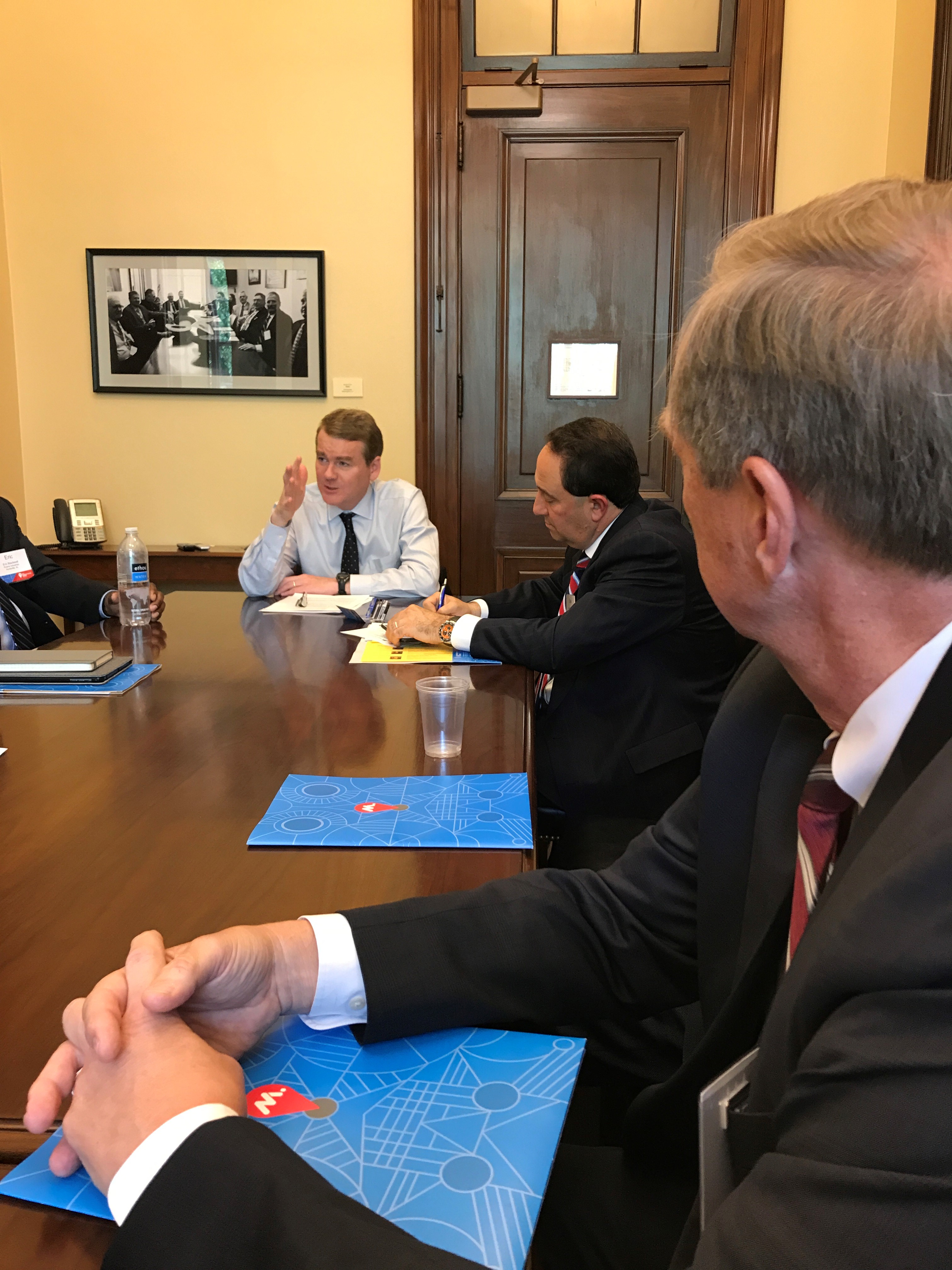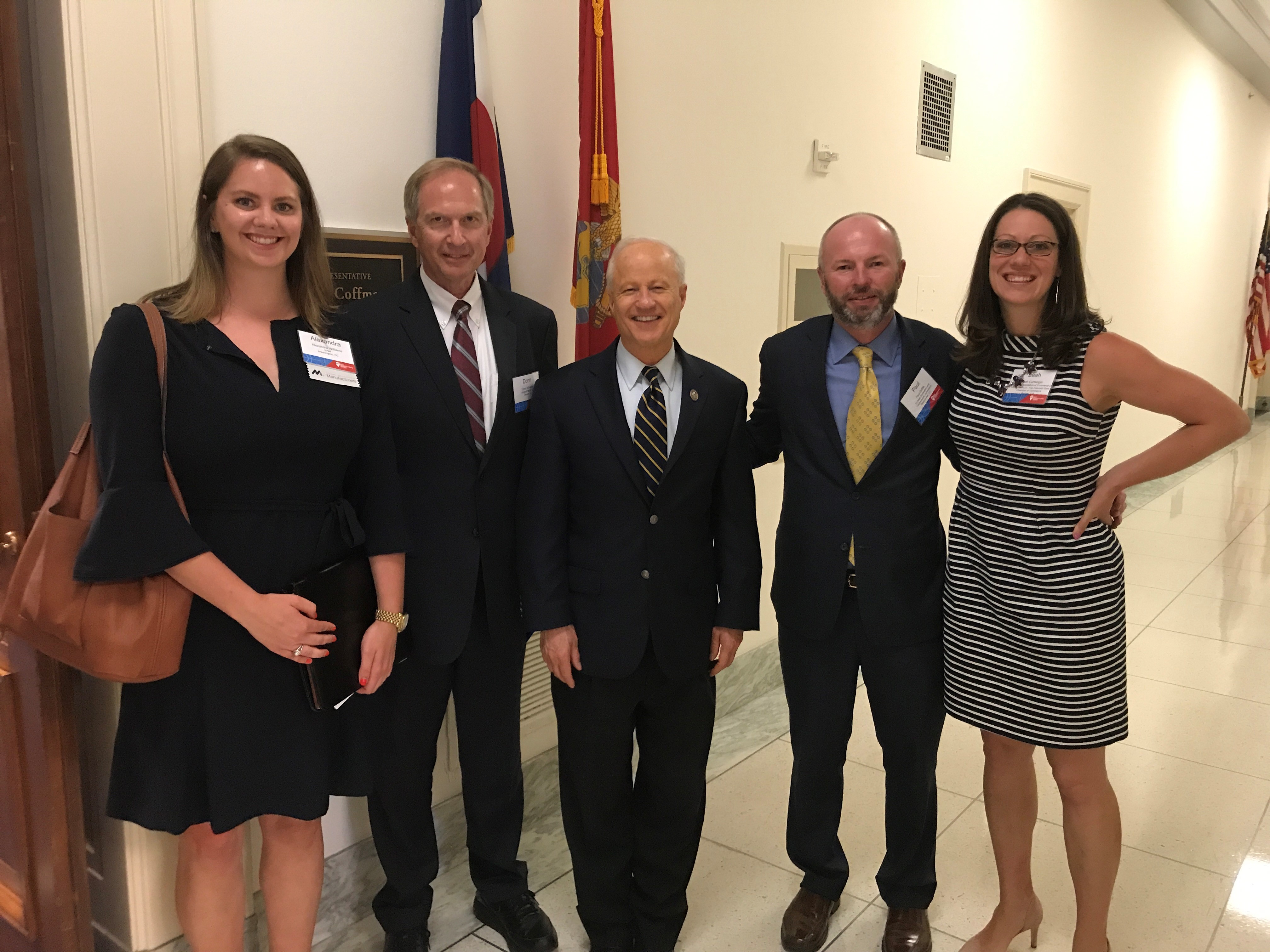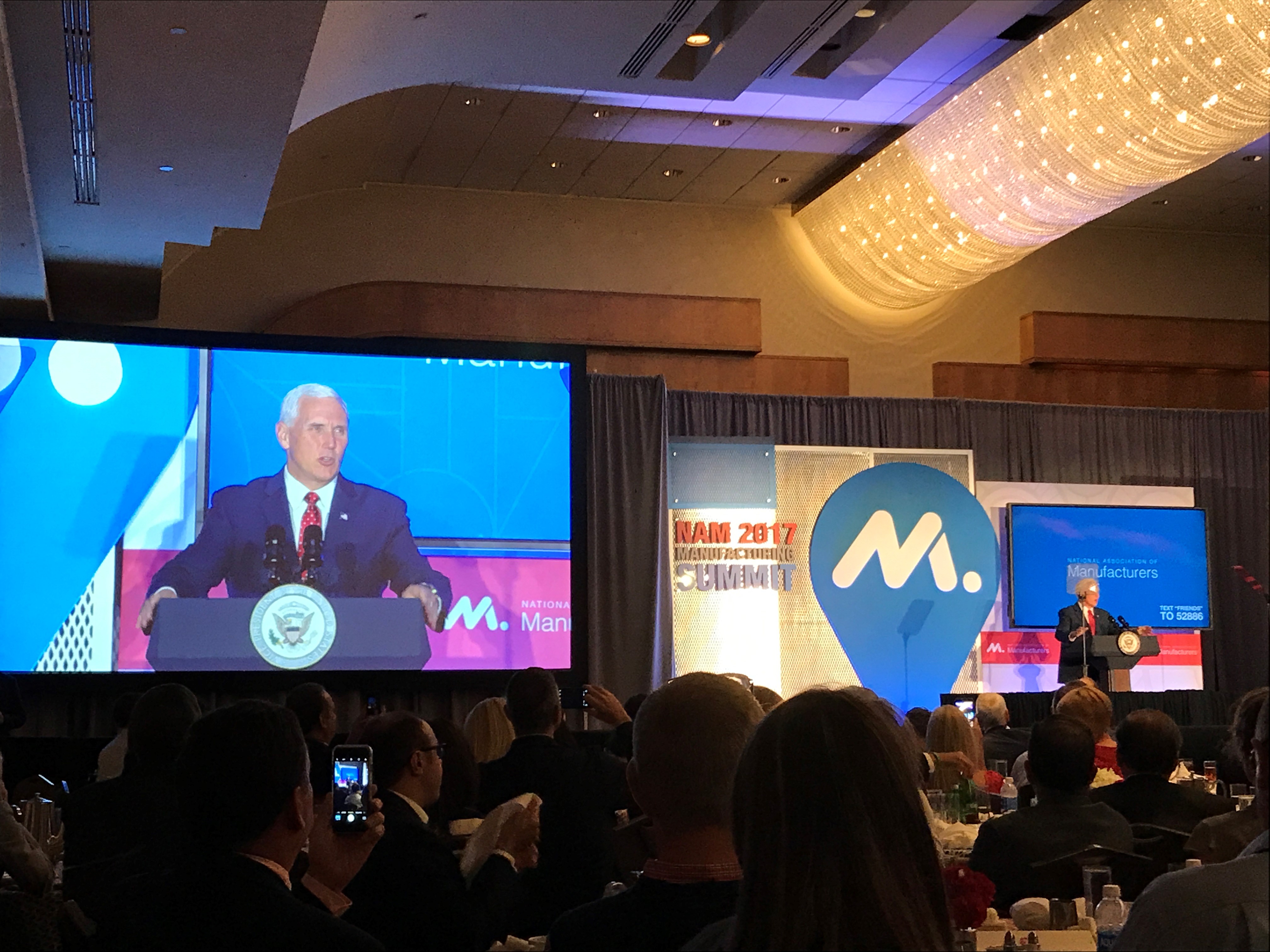In this Capitol Report:
This Capitol Report is brought to you by:
Federal Policy News
Senate Delays Procedural Vote On AHCA, So What’s Next For Healthcare?
Last week in DC, Members of Congress and Senate staffers alike scrambled to prepare as news of draft Senate healthcare language would be made public Thursday morning (6/22). Majority Leader Mitch McConnell (R-KY) announced that a CBO score from the non-partisan Congressional Budget Office was likely to follow as early as Monday (6/26).
However, the CBO score published this week was nowhere near where Senate Republicans had hoped it would be. Analysts with the CBO said proposed Senate language would save the U.S. government $321 billion over 10 years (the House version saved $110 billion) and would cut $772 billion from Medicaid, but that the Senate’s reforms would likely leave 15 million people without health insurance by next year, with 22 million potentially without insurance by 2026 (the House language was slightly worse at 23 million). The CBO took an additional, and somewhat unprecedented, step in warning that insurance premiums could “skyrocket” under the Senate language.
The House-passed healthcare reform language, H.R. 1628 is the Better Care Reconciliation Act of 2017 but the Senate will use a ‘strike & replace’ option to remove the House’s language from the vehicle/bill and insert their own language. Although McConnell had announced votes would take place yesterday, there was enough questions among Republicans to prevent the procedural “Motion to Proceed” (MTP) from moving forward, and an MTP is debatable so it is possible to filibuster an MTP.
Additionally, because H.R. 1628 is a reconciliation vehicle, the threshold for proceeding with an MTP is only a simple majority, but it also means Republicans can only “lose” two votes from their block of 52-votes. Unless Republicans can muster enough support for MTP to address the Senate’s legislation, the bill is stuck until either enough concessions are made by leadership to garner more votes, or the bill is pulled by Senate leadership. Rumors on Capitol Hill are that McConnell will announce proposed amendments today, ahead of the July Fourth recess in order to allow Senators time and an opportunity to get behind the Senate’s reform language. There are currently a handful of Senators unsupportive or uncertain of the Senate’s language, including: Sens. Rand Paul (R-KY), Susan Collins (R-ME), Mike Lee (R-UT), Shelley Moore-Capito (R-WV), Rob Portman (R-OH), Ted Cruz (R-TX), Jerry Moran (R-KS) and Dean Heller (R-NV). Congress returns to D.C. on July 10th to resume negotiation efforts.
What You Need To Know: House vs. Senate language
Senate language:
- Eliminates penalty for going without insurance; House language approved a 30% premium surcharge on consumers who allow previous coverage to lapse.
- Medium and large companies would not be required to provide coverage; same as House language.
- Cost-sharing subsidies would be eliminated after 2 years, valued at $7B this year; House would end in 2020, but President Trump would have discretion to end earlier.
- Bans Planned Parenthood from Medicaid participation for 1 year; same in House.
- Pre-Existing Conditions: Senate still requires coverage, but states could waive certain insurance rules which would affect how many/which benefits are covered. House would allow states to opt out of requirement to charge all customers the same regardless of pre-existing conditions.
- Medicaid Expansion: Increases federal payments for states that expanded Medicaid under ACA, but would rollback those payments over 3 years, beginning in 2021. House rollback would start in 2020 for those coming off Medicaid & enhanced funding wouldn’t exist for new enrollees.
- Traditional Medicaid: Senate language completely revamps how states would receive funding and gives flexibility to states, based on funds for each enrollee (low-income kids, pregnant women, the elderly and people with disabilities) vs. the existing open-ended funding program. Starting in 2025, the Senate uses a slower annual growth rate for state payments.
- Insurance Tax Credits: Eligibility for subsidies scales back to 350% of federal poverty line in 2020, would be tied to benchmarks like ACA, would be based on income levels and would include lower subsidies. House bill links to age rather than income, but does not account for additional expenses of high cost areas.
- Taxes: Senate language repeals almost all ACA taxes including medical devices, health insurers, surtax on high earners investment income & the Medicare Hospital Insurance surtax. House eliminates a few more industry taxes, including on pharmaceutical manufacturers.
- BONUS: Opioid Funding: Wasn’t part of Affordable Care Act (ACA), but Senate would give $2 billion to states next year; House would give $45 billion over 10 years.
CACI Members Stake Out Their Positions on Healthcare
Some of CACI’s insurance members have taken a close look at what reform could look like for their companies. While any changes made to the Affordable Care Act (ACA) could have an effect on Medicaid beneficiaries, as well as on the individual market, there are certain provisions CACI members will be watching closely: whether Senate language continues to include a market stabilization program, a reduction of taxes on multiple fronts, enhanced credits for younger participants (18-34), plus ensuring continuous care provisions remain part of proposed language.
“We are committed to market-based solutions and public-private partnerships that improves affordability, value, access, and well-being for consumers.” — America’s Health Insurance Plans (AHIP)
The U.S. Chamber has also added their support behind the Senate’s mission to reform healthcare:
“The Senate health care bill will help to stabilize crumbling insurance markets caused by the Affordable Care Act, work to curb runaway premium increases, and jettison ill-conceived Washington mandates and taxes that have weighed heavily on our economy. This is an extremely important step in putting doctors and patients ahead of politicians when it comes to American health care.
“This bill appears to strike an important balance between providing ample attention to the much needed safety net for underserved communities without putting Washington in charge of health care. We have long sought this type of balanced solution that doesn’t jeopardize employer sponsored coverage, while seeking affordable access for all Americans. The Senate’s approach appears to do just that.” — U.S. Chamber of Commerce President and CEO Thomas J. Donohue
CACI Teams Up With the NAM for Annual Manufacturing Summit & Hill Meetings
Last week, CACI’s Federal Policy Director Leah Curtsinger joined CACI member companies and several hundred manufacturers from around the U.S. at the annual National Association of Manufacturing Summit in Washington, D.C. This year’s two-day summit highlights included nationally televised addresses with Vice President Mike Pence to talk healthcare and regulatory reform, as well as a speech from U.S. House Speaker Paul Ryan (R-WI) debuting final changes on his tax reform proposal.
Throughout the two days, NAM and attendees briefed Members of Congress on key issues facing manufacturers, including tax reform and provisions championed by NAM, as well as infrastructure investment being an “all of the above” investment plan which should include airports and railways, not just roads and bridges. The NAM also championed bipartisan regulatory efforts and addressing the workforce skills gaps that many manufacturers see, particularly with 3.5 million manufacturing jobs that will need to be filled in the next 10 years, and which passage of the Perkins Act would help address.
In between meetings with the Colorado Congressional delegation, Summit attendees also heard from the Department of Labor Secretary Acosta, as well as House Majority Leader Kevin McCarthy (R-CA) about changes to the Labor Department and how McCarthy started his first business.

CACI group with Senator Bennet

CACI attendees with Congressman Coffman

Speaker of the House of Representatives Paul Ryan at the NAM Summit

Vice President Pence addressing the crowd at the NAM Summit
All in all, the meetings were a great success and CACI looks forward to bringing more member companies in the future.
State Policy News
CACI Submits Comments to CDPHE Concerning Waste from Oil-and-Gas Production
A committee of CACI’s Energy and Environment Council has submitted comments to the Colorado Department of Public Health and Environment (CDPHE) that concern the acceptance by landfills of “Technologically Enhanced Naturally Occurring Radioactive Material” (TENORM) contained in oil-and-gas exploration-and-production (E&P) waste.
On behalf of the Energy and Environment Council, the CACI Industrial Waste Committee submitted a revised comment letter in response to the May 12th Notice Letter that CDPHE sent to solid-waste landfill owners and operators.
The Notice asserts that solid-waste landfills may not accept E&P waste containing TENORM above certain administrative release levels without additional state-and-local government approval. The Notice is applying aspects of the Department’s Final Draft Interim Policy and Guidance Pending Rulemaking for the Control and Disposition of TENORM in Colorado (“Interim TENORM Guidance”) to E&P waste.
The Interim TENORM Guidance was developed through a stakeholder process primarily for the disposal of water-treatment residuals and was issued on the express assumption that regulatory standards would eventually be promulgated. Interim TENORM Guidance was intended to be formally expanded to address other industry sectors through separate stakeholder processes.
In lieu of a rulemaking or expansion of the guidance, however, CDPHE issued the May 12th Notice Letter to change the current manner in which E&P waste may be disposed.
Please be advised that this change may result in significant costs and delays for solid-waste landfills and E&P-waste generators without clear authority for these standards.
By bypassing both a rulemaking and a guidance-stakeholder process, a lack of transparency exists for the regulated community regarding testing standards and other requirements imposed by CDPHE.
In light of the above concerns, CACI understands that other organizations, including the Colorado Oil and Gas Association (COGA) and the Colorado chapter of the Solid Waste Association of North America (SWANA), are planning to request that CDPHE delay the deadlines set forth in the May 12th Notice Letter and allow current-and-future requirements contemplated by that letter to be reviewed as part of a formal stakeholder process.
CACI members with concerns or questions about this issue should contact CACI contract lobbyist Bill Skewes.

